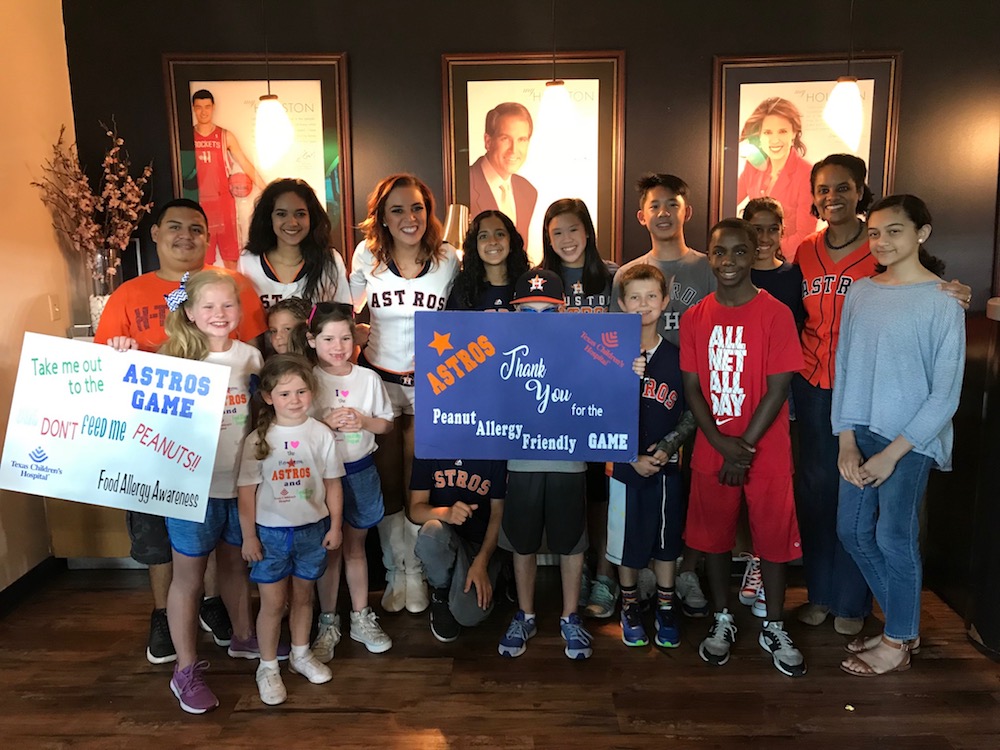Topics

Images courtesy of Theresa Aldape
As a father, I often cherish the simple moments and shared experiences I’m granted with my children, including my 13-year-old daughter, Serina.
Serina is an eighth grader at The Village School, and she loves to dance, travel, read and hang out with her friends. She also enjoys basketball and plays percussion for her school’s band. Sounds like a typical teenager, right? Serina does pretty much everything you’d expect of a kid her age, but with one exception.
She has multiple food allergies – potentially life-threatening food allergies. These obviously come hand-in-hand with some major limitations.
Serena’s food allergy journey started close to her first birthday when she developed a rash after eating a scrambled egg. Since this day, we’ve come to learn of her numerous food allergies after careful testing and, not to mention, a few scary incidents.
In addition to eggs and chickpeas, Serina is also severely allergic to peanuts, tree nuts and lentils. If she consumes any of these allergens, even in the smallest of quantities, she can easily find herself in anaphylactic shock. While she hasn’t had to self-administer an EpiPen on her own yet, we’ve resorted to using it in a few urgent situations.
One of these situations took place a few years back when Serina came home from school on a Friday afternoon, eager to decorate our front yard for Halloween. She quickly ate a snack prepared by her grandmother and ran outside to help me set up lights, pumpkins and other spooky decorations. She started to complain of a scratchy throat within a few minutes, which wasn’t exactly atypical as she suffered from seasonal allergies. I instructed her to go inside and take a Zyrtec, which she did. When she didn’t return after a few minutes, I went inside and found her in the bathroom with her mother, complaining of chest discomfort and troubled breathing.
Serina didn’t have a rash or any hives, but she was incredibly uncomfortable. She was having an anaphylactic reaction, and we weren’t sure what from. We quickly decided to administer the EpiPen and rushed to the car – we weren’t going to wait around for an ambulance. In the car, Serina immediately started feeling the effects of the epinephrine and her breathing steadily improved as we mad our way to the emergency room.
While we spent the next several hours at the hospital, we learned the after-school snack she ate had chickpeas in it. Serina had never been tested for a chickpea allergy before. This was a new allergen to us, but we weren’t surprised when we found out they’re part of the legume family, similar to a peanut. Luckily, Serina recovered quickly and went home that night. It could’ve been much worse though, and we couldn’t help but wonder – “what if?”
We take a lot of precaution as a family in our day-to-day lives, but Serina is growing up quickly and learning to navigate her food allergies on her own. She can’t buy lunch at the school cafeteria. She can’t eat cake at a friend’s birthday party. She can’t roam freely at a buffet and definitely can’t eat on airplanes. She also has to be extremely cautious at events, concerts and so on.
We have a duty as parents to start encouraging personal responsibility with our food allergy children as they get older and become more capable of understanding and managing their health. If we empower our children to be self-sufficient, they’ll be prepared for potential medical emergencies in the future when we’re not there to help. Our family might still face some challenges, but Serina has truly become her own best advocate. Because of this, she has been able to eat at restaurants willing to accommodate us, travel on up to 10 flights every year and enjoy life comfortably like a typical teenager.
Our family is thankful to actively work with Texas Children’s Hospital and their Food Allergy Family Network (FAFN). FAFN, which was created by Texas Children’s Food Allergy Program, gives local families with food allergies the opportunity to meet each other, volunteer and promote food allergy awareness in the community.
Recently, FAFN was able to accomplish something incredible.
I’ve always wanted to take my family to a baseball game, but I share the same fear and anxiety as other food allergy families who avoid these outings due to the high exposure to concession peanuts. Fortunately, most large baseball stadiums across the country have started to offer peanut-free events and some even accommodate food allergy families with peanut-free designated seating. I started to wonder why our Houston team didn’t follow suit of most of the other Major League Baseball (MLB) stadiums, at least officially. Through the FAFN, we started to do some networking and soon found ourselves taking a tour of the park to find an ideal spot for a peanut-free event sponsored by Texas Children’s.
On July 14, 2018, Texas Children’s Hospital hosted its inaugural Peanut Allergy-Friendly Day as our home team played the Detroit Tigers. We had a blast with other food allergy families, and it was a joy to watch our children enjoy an anxiety-free baseball game at our home ballpark. We didn’t have any peanuts in our suite, and every food offering had a label with ingredients. We couldn’t have done this without generous help and assistance from the Harris County Houston Sports Authority, Premium Sales, Aramark and countless individuals from Texas Children’s, including Frank Stowell. Our hope is to host an even larger event next year so more peanut allergy fans can attend a baseball game.
The fifth annual Food Allergy Symposium, presented by the Texas Children’s Food Allergy Program, will be held on Sept. 29, 2018, at the United Way Community Resource Center. If you’re interested in registering, click here.


